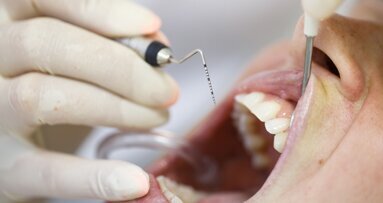LEEDS, UK: Though dental fillings are an established method of treating the presence of dental caries in permanent dentition, their usefulness for treating caries in primary dentition remains under debate. A new study has cast further doubt on the appropriateness of this approach, suggesting that there is no evidence that conventional fillings are more effective in stopping further caries and/or pain in children than other treatment modalities are.
The study analysed the results of the FiCTION (Filling Children’s Teeth: Indicated or Not) trial, which involved 1,144 UK-residing children between 3 and 8 years old who suffered from caries. Each participant was randomly assigned one of three treatment options for the duration of the trial (which lasted up to three years for some children): the standard “drill and fill” approach, which involves drilling out the decayed tissue; a minimally invasive approach of sealing the caries under a metal crown or filling; and the avoidance of any fillings being placed while also emphasising a reduction in sugar intake and the necessity of taking greater care of the child’s oral health.
A total of 450 participants reported that they continued to experience further caries and pain. There were no significant differences between the outcomes for each of the three treatment groups.
“Our study shows that each way of treating decay worked to a similar level but that children who get tooth decay at a young age have a high chance of experiencing toothache and abscesses regardless of the way the dentist manages the decay,” said Prof. Nicola Innes, chair of paediatric dentistry at the University of Dundee School of Dentistry and lead author of the study.
“What is absolutely clear from our trial is that the best way to manage tooth decay is not by drilling it out or sealing it in—it’s by preventing it in the first place,” Innes added.
The study, titled “Child caries management: A randomized controlled trial in dental practice”, was published online on 26 November 2019 in the Journal of Dental Research, ahead of inclusion in an issue.
Tags:
BELFAST, UK: According to a new study by researchers at Queen’s University Belfast, aspirin could reverse the effects of dental caries. According to the ...
NOTTINGHAM, UK: Given what we know about the relationship between rates of obesity and sugar consumption, it would seem to be common sense that children who...
PLYMOUTH, UK: Though dentistry can be a highly stressful field to work in at times, little research has been done into how time pressure can affect a ...
LONDON, UK: Despite improvements in treatments, intra-bony defects are associated with progression of periodontal disease and tooth loss unless they are ...
LIVERPOOL – Owing to the absence of a uniform testing standard within the NHS, researchers have analysed a new test developed to classify ...
LONDON, England: More than a third of UK adults in a study by periodontal health brand Corsodyl experience bleeding gingivae at least once a month when they...
PLYMOUTH, UK: In a recent study, researchers investigated the role of oral bacteria in the development of brain abscesses. They found that the samples of ...
LONDON, UK: A publication released by the NHS has shown that 57.7 per cent of children in England aged between 1 and 4 years failed to see an NHS dentist in...
BROMLEY, UK: When beauty therapist Caroline Sumpter from Bromley bought a Megawhite Teeth Whitening Licence from Dentawhite in Glasgow, she was not aware ...
LONDON, UK: Though the relative benefits of chewing gum are often subject to debate, a number of studies have shown that the sugar-free varieties can ...
Live webinar
Tue. 3 March 2026
4:00 pm UTC (London)
Dr. Omar Lugo Cirujano Maxilofacial
Live webinar
Wed. 4 March 2026
1:00 am UTC (London)
Dr. Vasiliki Maseli DDS, MS, EdM
Live webinar
Wed. 4 March 2026
5:00 pm UTC (London)
Munther Sulieman LDS RCS (Eng) BDS (Lond) MSc PhD
Live webinar
Wed. 4 March 2026
6:00 pm UTC (London)
Live webinar
Fri. 6 March 2026
8:00 am UTC (London)
Live webinar
Tue. 10 March 2026
8:00 am UTC (London)
Assoc. Prof. Aaron Davis, Prof. Sarah Baker



 Austria / Österreich
Austria / Österreich
 Bosnia and Herzegovina / Босна и Херцеговина
Bosnia and Herzegovina / Босна и Херцеговина
 Bulgaria / България
Bulgaria / България
 Croatia / Hrvatska
Croatia / Hrvatska
 Czech Republic & Slovakia / Česká republika & Slovensko
Czech Republic & Slovakia / Česká republika & Slovensko
 France / France
France / France
 Germany / Deutschland
Germany / Deutschland
 Greece / ΕΛΛΑΔΑ
Greece / ΕΛΛΑΔΑ
 Hungary / Hungary
Hungary / Hungary
 Italy / Italia
Italy / Italia
 Netherlands / Nederland
Netherlands / Nederland
 Nordic / Nordic
Nordic / Nordic
 Poland / Polska
Poland / Polska
 Portugal / Portugal
Portugal / Portugal
 Romania & Moldova / România & Moldova
Romania & Moldova / România & Moldova
 Slovenia / Slovenija
Slovenia / Slovenija
 Serbia & Montenegro / Србија и Црна Гора
Serbia & Montenegro / Србија и Црна Гора
 Spain / España
Spain / España
 Switzerland / Schweiz
Switzerland / Schweiz
 Turkey / Türkiye
Turkey / Türkiye
 UK & Ireland / UK & Ireland
UK & Ireland / UK & Ireland
 International / International
International / International
 Brazil / Brasil
Brazil / Brasil
 Canada / Canada
Canada / Canada
 Latin America / Latinoamérica
Latin America / Latinoamérica
 USA / USA
USA / USA
 China / 中国
China / 中国
 India / भारत गणराज्य
India / भारत गणराज्य
 Pakistan / Pākistān
Pakistan / Pākistān
 Vietnam / Việt Nam
Vietnam / Việt Nam
 ASEAN / ASEAN
ASEAN / ASEAN
 Israel / מְדִינַת יִשְׂרָאֵל
Israel / מְדִינַת יִשְׂרָאֵל
 Algeria, Morocco & Tunisia / الجزائر والمغرب وتونس
Algeria, Morocco & Tunisia / الجزائر والمغرب وتونس
 Middle East / Middle East
Middle East / Middle East



















































To post a reply please login or register